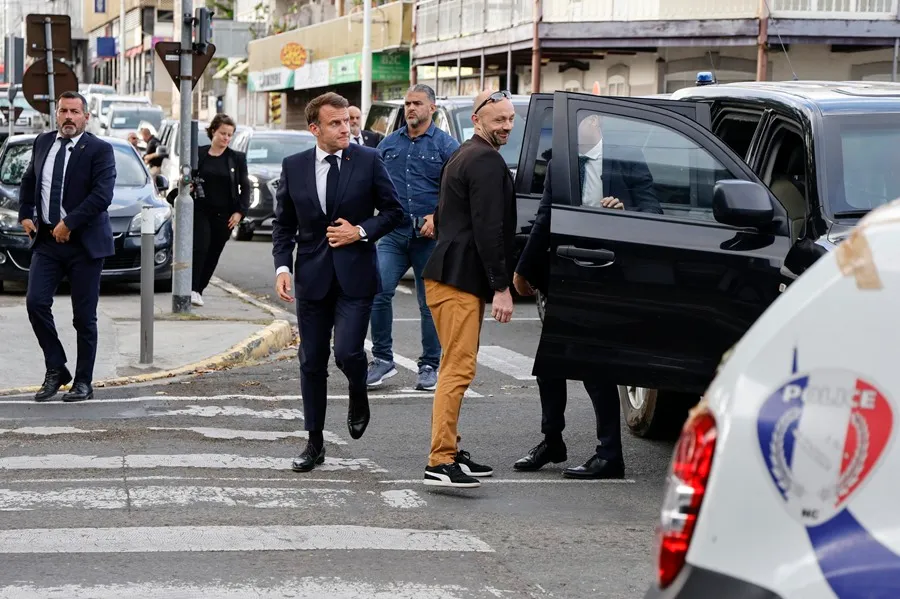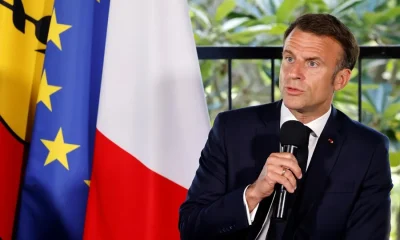International
Macron: the return of dialogue in New Caledonia will not be made with institutional setback

The French president, Emmanuel Macron, held a first meeting with political leaders in New Caledonia on Thursday to try to relaunch a dialogue between communities that puts an end to the riots, without an institutional setback.
Macron bet on the return to calm, but warned that this cannot be done by reversing the institutional level, specifically on the result of the three self-determination referendums held in that territory of the South Pacific in recent years.
“The appeasement cannot be not respecting the popular expression that has already been manifested,” he said, according to the images of the meeting disclosed by the Elysée.
However, Macron did not clarify whether the controversial constitutional law that opens the electoral census of the territory, whose approval in the French Parliament unleashed the wave of protests at the beginning of last week, will be maintained.
At the beginning of the meeting, a minute of silence was observed for the six deaths of last week, four civilians and two gendarmes.
The meeting took place at the residence of the High Commissioner (Government delegate) in the autonomous territory, and attended by independence leaders such as the presidents of the regional government, Louis Mapou, and the president of the regional Congress, Roch Wamytan.
They also attended loyalist leaders, such as the president of the southern province (one of the three that make up the territory), Sonia Backès, or the mayor of the capital, Numea, Sonia Lagarde.
Macron was in favor of not renewing the state of emergency, declared by the Government last week and which expires on Monday the 27th, but he conditioned it to the return of the situation to normal and all the barricades on roads and streets mounted by independence groups to be removed.
He also said that the reinforcement of a thousand police and gendarmes sent last week to reinforce the 1,700 agents already present in the territory will remain “as long as necessary,” even until the end of the Olympic and Paralympic Games. The latter conclude on September 8.
Macron arrived on Thursday morning local time in the territory for a visit of about twelve hours, with the aim of giving a boost to the dialogue.
Although the situation has improved with respect to the worst moments of last week, it has not yet fully normalized.
A large part of the population continues to have problems with access to food and basic hygiene products due to the destruction of shops and travel difficulties, according to local media.
On the other hand, the damage of the riots amounts to about one billion euros, as reported today by the Chamber of Commerce of Industry, with about 200 companies burned and more than 2,000 unemployed workers.
Central America
Senator Van Hollen Meets with Deported MS-13 Member in El Salvador; Trump and Bukele React

U.S. Democratic Senator Chris Van Hollen, representing the state of Maryland, held a meeting in El Salvador with deported MS-13 gang member Kilmar Ábrego García, a member of the criminal group classified by the U.S. government as a terrorist organization.
“Kilmar Ábrego García, miraculously resurrected from the ‘extermination camps’ and ‘torture chambers,’ now sipping margaritas with Senator Van Hollen in the tropical paradise of El Salvador!” wrote President Nayib Bukeleon X (formerly Twitter), sharing photos of Van Hollen, Ábrego García, and a lawyer sitting together at a Salvadoran hotel.
The deported gang member is seen wearing a plaid shirt and a flat-brimmed cap, seated at a table with glasses and coffee cups. The senator also shared images of the meeting on his own social media accounts.
Bukele reaffirmed that Ábrego will remain in El Salvador and will not be returned to the United States.
“Now that his health has been confirmed, he has earned the honor of remaining under the custody of El Salvador,” Bukele added.
Former U.S. President Donald Trump criticized the senator’s meeting with Ábrego on Truth Social, calling Van Hollen “a fool” for advocating for Ábrego’s return to the U.S.
International
Pope Francis Appears for Easter Blessing, Calls for Peace and Religious Freedom

Pope Francis, still recovering from pneumonia, appeared on the balcony of St. Peter’s Basilica in the Vatican on Easter Sunday and, with a faint voice, wished a “Happy Easter” to the thousands of faithful gathered to celebrate the Resurrection of Christ.
A month after being discharged from a lengthy hospital stay, the presence of the 88-year-old pontiff had remained uncertain, with the Vatican not confirming his attendance ahead of time.
Eventually, the pope made a brief appearance in a wheelchair shortly after 12:00 p.m. (10:00 GMT) to deliver his traditional “Urbi et Orbi” blessing (“to the city and to the world”).
Although no longer wearing an oxygen cannula, the Argentine Jesuit relied on a close aide to read his Easter message, which touched on major global conflicts.
Francis condemned the “dramatic and unworthy humanitarian crisis” in Gaza and called for a ceasefire, while also expressing concern over the “growing climate of antisemitism spreading across the globe.”
He further emphasized the importance of religious freedom and freedom of thought, stating that without mutual respect, “peace is not possible.”
International
Thousands rally nationwide against Trump’s threat to U.S. democracy

Thousands of protesters gathered on Saturday (April 19, 2025) in major cities like New York and Washington, as well as in small communities across the United States, in a second wave of demonstrations against President Donald Trump. The crowds denounced what they view as growing threats to the country’s democratic ideals.
In New York City, demonstrators of all ages rallied in front of the Public Library near Trump Tower, holding signs accusing the president of undermining democratic institutions and judicial independence.
Many protesters also criticized Trump’s hardline immigration policies, including mass deportations and raids targeting undocumented migrants.
“Democracy is in grave danger,” said Kathy Valyi, 73, the daughter of Holocaust survivors. She told AFP that the stories her parents shared about Adolf Hitler’s rise to power in 1930s Germany “are happening here now.”
In Washington, demonstrators voiced concern over what they see as Trump’s disregard for long-standing constitutional norms, such as the right to due process.
-

 International4 days ago
International4 days agoArsenal stun Real Madrid at the Bernabéu to reach Champions League semifinals
-

 Central America3 days ago
Central America3 days agoNicaraguan Exiles to Mark 7th Anniversary of 2018 Protests with Global Commemorations
-

 International3 days ago
International3 days agoDominican ‘False Hero’ Arrested for Faking Role in Nightclub Collapse That Killed 231
-

 International2 days ago
International2 days agoACLU seeks emergency court order to stop venezuelan deportations under Wartime Law
-

 International4 days ago
International4 days agoBogotá residents line up for yellow fever vaccine amid national alert
-

 International4 days ago
International4 days agoDeSantis’ immigration crackdown sparks alarm in Venezuelan Communities in Doral
-

 Central America2 days ago
Central America2 days agoUN complaint filed against Costa Rica over detention of migrant children
-

 International4 days ago
International4 days agoMexico refuses to restore ties with Ecuador while Noboa remains in office
-

 International1 day ago
International1 day agoThousands rally nationwide against Trump’s threat to U.S. democracy
-

 Central America9 hours ago
Central America9 hours agoSenator Van Hollen Meets with Deported MS-13 Member in El Salvador; Trump and Bukele React
-

 International9 hours ago
International9 hours agoPope Francis Appears for Easter Blessing, Calls for Peace and Religious Freedom

















